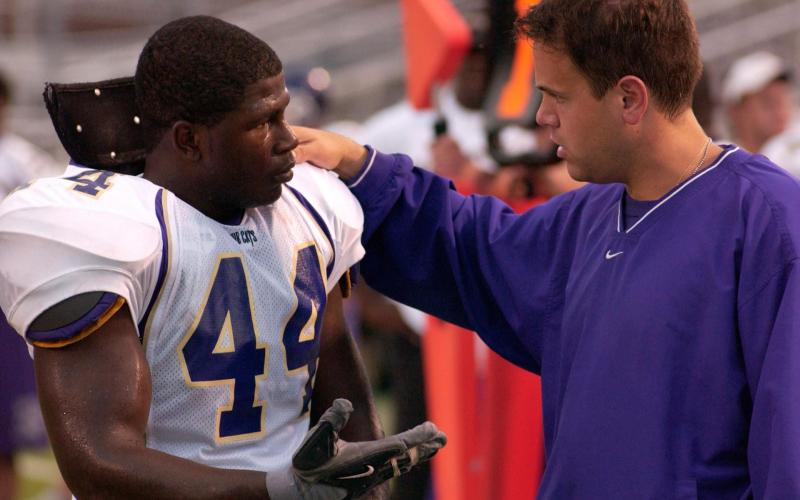By: Daniel Hooker
Cullowhee, N.C. – Former Western Carolina assistant coach Matt Rhule (2002-05) has been dubbed the next head coach of the NFL’s Carolina Panthers, it was officially announced Tuesday afternoon. Reports of Rhule’s hire in Charlotte began to surface on Tuesday mid-morning before the team officially announced just after 3:00 pm on their website, CarolinaPanthers.com.
During his four seasons on the sidelines for the Catamounts, Rhule coached a myriad of positions including linebackers and offensive line while also coordinating both the run game and special teams, all while eventually garnering the title of assistant head coach. Over his last couple of seasons in Cullowhee, Rhule additionally handled many of the football office representative duties in former WCU head coach Kent Briggs absence while he battled cancer.
“Some guys you know are special when you first meet them. Matt Rhule is one of those guys,” said Briggs on Tuesday. “I am not surprised that he has moved into this opportunity so fast; he did with me at Western Carolina as I moved him up fast in our program by giving more responsibilities every chance I got. He is a great communicator and motivator with a real gift of connecting with his players.”
Over Rhule’s first three seasons in Cullowhee, he directed a linebacking corps that set the tone for a Catamount defense that became one of the top-rated units in the nation. As WCU’s 2004 defense ranked 12th in the NCAA FCS in total defense – and inside the NCAA’s top 50 in nine categories – it was Rhule’s linebackers that led the way, taking the top five spots in total tackles. Travis Hill, then a true freshman, led the way with 48 total tackles, twice garnering SoCon Defensive Player of the Week honors. Among the other 2004 LB’s spearheading the WCU defense were James Conklin, Shelton Gaffney, Lamar Barnes, and Jada Sullivan.
In addition to WCU’s defensive unit excelling under the 1997 Penn State graduate, WCU found much success with Rhule coordinating the Catamount special teams in ‘04. Punter Tim Mayse led the SoCon in punting while the punt coverage unit limited foes to just a 6.61 yard per return average, 25th in the nation. Conversely, Francis Brown (2003-05) – now an assistant coach at Rutgers – ranked third in the SoCon in punt return (9.4-yard average) that included an 83-yard punt return for a touchdown at Gardner-Webb – the third-longest punt return in program history.
In 2005 with Rhule on staff, the Catamount defense led the nation in pass defense, limiting the opposition to an average of 132.33 passing yards per game. WCU additionally ranked high in pass efficiency defense (fifth, 98.81), total defense (18th, 310.56 yds/gm), and scoring defense (22nd, 19.79 points per game) in 2005. On special teams, thanks in part to Mike Malone ranking second nationally in kick return yardage (31.29 yds/ret), WCU paced the SoCon and the NCAA in kickoff returns under Rhule’s tutelage, averaging 27.44 yards per return.
As a part of the coaching staff in 2003, Rhule mentored former linebacker Rod Dunlap (2001-03) as a part of a defensive group that led the SoCon in rush defense for the first time ever. Dunlap finished his career and continues to rank tied for fourth in program history with 45 tackles for loss.
During Rhule’s time in Cullowhee, five Catamount players collected All-Southern Conference honors including OL Jason Whaley (2002), LB Rod Dunlap (2003), P Tim Mayse (2004, 2005), KOR Mike Malone (2005), and LB Lamar Barnes (2005).
Following his time in Cullowhee, Rhule went on to be a position and later the head coach at Temple (2013-2016), transforming the Owls from a 2-win season in his first season to consecutive 10-win years before taking over the beleaguered Baylor program over the past three seasons, turning the Bears’ fortunes around from 1-11 in 2017 to 11-3 in 2019.

